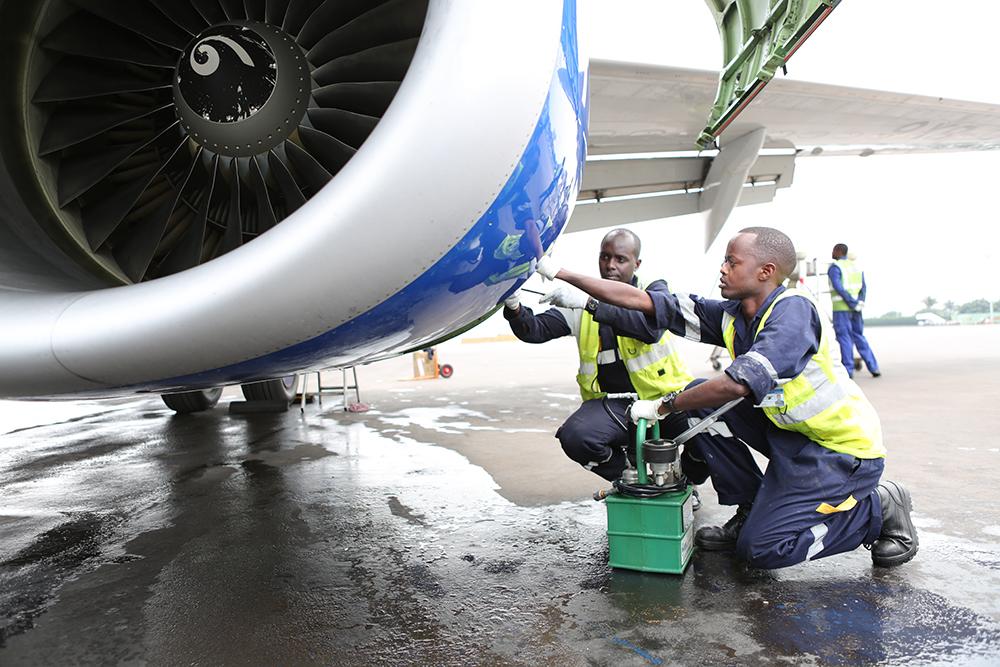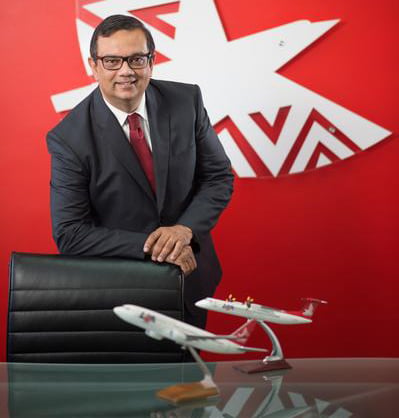
LAM Mozambique CEO Joao Carlos Po Jorge, who originally trained as an engineer, is calling for greater technical cooperation among African airlines as he prepares to sign a spare parts pooling agreement with Ethiopian Airlines for Q400 aircraft.
The new agreement forms part of the African Airlines Association’s (AFRAA) line maintenance pooling initiative, which aims to cut costs and minimize operational disruption for African operators.
“When pooling their resources, one of the member airlines positions a critical part, such as the main wheel assembly, at a particular airport. The initiative grants access to all participating airlines to the said spare wheel at modest fees,” AFRAA says on its website.
Maputo-based LAM is 80 years old, making it one of Africa’s oldest airlines, and its fleet comprises three Embraer ERJ-145s, four De Havilland Dash 8-400s and two Boeing 737-700s.

Credit: LAM Mozambique
“We definitely need to make more noise about this AFRAA initiative,” Po Jorge said, speaking on a recent AFRAA webinar. “It's not only parts pooling; I see there are also some component repair opportunities. There's no reason why you should stock brakes in all your outstations, or even wheels, if you have Kenya Airways, Ethiopian Airlines, LAM, Airlink, or whichever airline [flying there].”
He added that pooling resources leads to “huge” advantages, including lower stock costs and greater parts availability. “We've done that [parts pooling] ad hoc, but it shouldn't be ad hoc. It should be planned and well prepared, at the flick of a button,” Po Jorge said.
Raphael Kuuchi, AFRAA’s director of government, legal and industry affairs, said the association is planning to further promote the parts-pooling initiative among its 46 airline members.
“In AFRAA, we will dedicate this year to make quite a lot of noise among our members about the need for them to do this, because this saves them a lot of a lot of money and makes their operations more efficient with very short ground times, in case they have an AOG,” said Kuuchi. “It's important. If we start collaborating this way, with baby steps, then they might see the need for further collaboration.”
Po Jorge, who joined LAM as an engineering intern in July 1983 and has also worked for Pratt & Whitney, is keen to encourage other Africans to pursue technical training. He described plans to add another two Dash 8-400s—and possibly a 737—this year, but this will require more trained personnel.
“We will need to hire some trained, experienced people in order to introduce some new equipment and expand at the speed we want,” he said. “We are already doing so, because luckily we can go to countries in the neighborhood to get experienced pilots and some mechanics.”
“But the biggest challenge is training local nationals to take over,” added Po Jorge. “The good news is we have a lot of raw material for that. We have a lot of very willing, very available and highly motivated young people that can be trained, and we need to invest in training. I give my personal commitment that 2023 is going to be the year that I want to dedicate to training.”
Po Jorge is also revisiting the idea of LAM introducing its own dedicated cargo operations, which has been mooted a few times in the past. “We don't have dedicated cargo; we just have cargo charters. We want to look into that, starting in 2023,” he said.
LAM’s revenue is already tracking ahead of pre-COVID levels and Po Jorge is expecting “significant growth” in 2023. “Over the period 2018-22, we have been able to move from an operating loss situation to a breakeven operation. We have been paying our bills in full since about a year ago,” he said.
Po Jorge is not alone in calling for greater cooperation among African airlines. On April 3, the International Air Transport Association (IATA) launched a new “Focus Africa” initiative, which includes six activity steams aimed at helping the continents’ airlines recognize their full potential. Safety, infrastructure and future skills are three of the streams.
“There's lots of opportunity to fully connect African countries to each other, and to the rest of the world,” RwandAir CEO and incoming IATA chairperson Yvonne Makolo told attendees of an April 3 webinar. “The best way to do that is through partnerships, whether from a consolidation perspective, or just from commercial partnerships, or technical partnerships. We need to work together as African airlines to fully connect out continent.”
RwandAir, itself, is looking to maximize MRO benefits from its strategic partnership with Qatar Airways, which was announced in 2020. The two airlines have already cooperated on maintenance skills training, and Qatar Airways MRO is planning to set up a line maintenance station at Kigali International Airport to support the RwandAir Airbus A330 fleet.
“RwandAir is evaluating collaboration, and not competition, with other regional MROs in order to spur growth,” RwandAir Acting Maintenance and Engineering Director Nelson Nabutse told Inside MRO last year. “The MROs identified include, but are not limited to, Ethiopian MRO, Kenya Airways MRO, Royal Air Maroc MRO, South African Airways Technical, Iberia, Samco and Globalia.”
At the moment, RwandAir uses Ethiopian Airlines to perform A and C checks on its De Havilland Canada Dash 8 Q400s and Boeing 737NGs. Bombardier CRJ900 A and C checks are handled by Samco, while Sabena Aerospace does A checks on RwandAir’s A330s. C checks for the A330s are outsourced to other suppliers, including Lufthansa and Qatar Airways.





